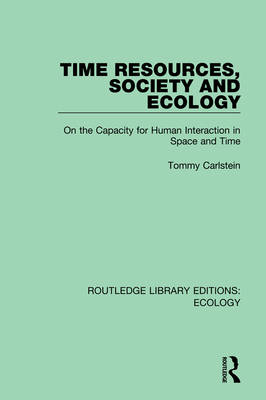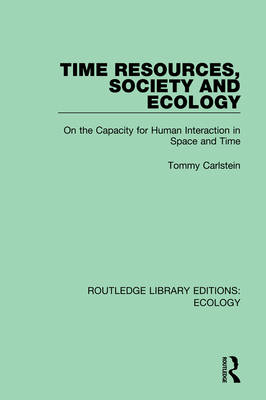
- Retrait gratuit dans votre magasin Club
- 7.000.000 titres dans notre catalogue
- Payer en toute sécurité
- Toujours un magasin près de chez vous
- Retrait gratuit dans votre magasin Club
- 7.000.0000 titres dans notre catalogue
- Payer en toute sécurité
- Toujours un magasin près de chez vous
Time Resources, Society and Ecology
On the Capacity for Human Interaction in Space and Time
Tommy CarlsteinDescription
Originally published in 1982, Time Resources, Society and Ecology examines and seeks to examine the time dimension in terms of the ecology, technology, social organization and spatial structure of the human habitat. Approaches to time resources - sociological time-budget studies, anthropological activity analysis, and economic analysis of money allocation - have been limited by their sectoral scope or their failure to relate effectively to the processes of social interaction, technological change and environmental structure. In this book, the book's articulation of time resources is developed in a general theoretical framework of action and interaction in time and space. The book examines constraints and possibilities facing preindustrial societies and throws light on the impact of technology on modern societies. Basic models of time allocation are presented, and, finally, a cross-cultural comparison is made of the mobilization of time resources in preindustrial societies. Geographers, social anthropologists and human ecologists should find this work directly relevant to their interest in understanding the interactions between man and environment.
Spécifications
Parties prenantes
- Auteur(s) :
- Editeur:
Contenu
- Nombre de pages :
- 460
- Langue:
- Anglais
- Collection :
- Tome:
- n° 1
Caractéristiques
- EAN:
- 9780367349677
- Date de parution :
- 04-10-19
- Format:
- Livre relié
- Format numérique:
- Genaaid
- Dimensions :
- 156 mm x 233 mm
- Poids :
- 1009 g

Les avis
Nous publions uniquement les avis qui respectent les conditions requises. Consultez nos conditions pour les avis.






